Videos by Joshua Jose Ocon
Arguably foremost among the questions which piqued the interest of Filipinos who have had a tinct... more Arguably foremost among the questions which piqued the interest of Filipinos who have had a tincture of academic philosophy, or related disciplines, is “Filipino philosophy” and whether there is such a thing. Notable scholars have opined as to the possibility and even necessity of predicating “Filipino” to possible philosophical concepts that a Filipino thinker would come up with. Gripaldo’s analysis of the term “Filipino philosophy” as comprehensible in three senses – traditional, cultural, constitutional – is significant in offering a perspective through which the status of the inquiry on “Filipino philosophy” can be further evaluated. The existence of “Filipino philosophy,” while in the traditional sense is still contingent on debates, is already realizable in the constitutional sense through the various works of Filipino scholars on Eastern and Western philosophical traditions, albeit as commentaries or as appropriations. On this note, the prospect of exploring “Filipino philosophy 79 views
The reality of human conflict, with its unfailing tendency to manifest itself, had received much ... more The reality of human conflict, with its unfailing tendency to manifest itself, had received much needed elucidation from the relevant fields of sociology, psychology, and even biology. From the standpoint of cultural anthropology, French intellectual René Girard theorizes a scheme through which such a phenomenon can be analyzed and understood – the presence of mimetic desire in human society. Girard’s proposal, aside from the framework through which it operates, is rather unique in its reliance on religious and scriptural themes, particularly on Christianity and the Gospels central to it. This same ‘Christianity,’ regardless of the lacks and excesses tied to it as recorded by history, undeniably remains influential to how many Filipinos deal with a community and the people included therein. This paper attempts to situate Girard’s theory within the Filipino milieu in order to shed light on the ever-pressing reality of conflict that continues to afflict us in several ways. 39 views
Courage in Tillich’s exposition is being’s self-affirmation in spite of its elements that deter t... more Courage in Tillich’s exposition is being’s self-affirmation in spite of its elements that deter this very capacity. This essay aims to situate Tillich’s treatment of the courage to-be within the trends observed in the COVID pandemic, and so provide an envisioned post-pandemic emergence attainable through an individual and collective overcoming of anxiety as manifested in its forms herein described. Tillich’s framework which is at once existential and ontological involves the cooperation of courage’s instantiations that modernism attempted to juxtapose – individualism as courage to be as oneself and collectivism as courage to be as part. Already exhibited by the undesirable experiences of the crisis so far, what is required of each and the whole in overcoming anxiety is a correspondent affirmation: the individual’s courage empowers that of the collective, and the collective confirms such vitalizing courage in its participation. 25 views
This paper attempts to cull out perspectives from Paulo Freire's pedagogy, particularly his con... more This paper attempts to cull out perspectives from Paulo Freire's pedagogy, particularly his conscientizacao that brings in a realist approach to the aforementioned and instigates a reevaluation of the notions of 'freedom, teaching, and learning within the context of authentic dialogue. It helps in recognizing that no genuine collective growth will obtain apart from every constituent’s awareness of the sociocultural realities that shape their lives, which leads, in turn, to the maturation of one’s freedom that does not impede but rather allows other freedoms to flourish without compromising others’ legitimate autonomy and their capacity to intervene in a society that requires transformation. This contextual approach to Freire's method, thus, provides prospects for a renewed understanding of pedagogy in the Philippine setting from the standpoints of Freirean theoria and praxis. 56 views
This paper seeks to explore the perspectives provided by the expositions of Stephen Hawking on si... more This paper seeks to explore the perspectives provided by the expositions of Stephen Hawking on singularity and black holes and Carlo Rovelli on a “world without time.” Considering Alfred North Whitehead’s bifurcation of the nature of God to cater to the delineation of time and temporality and eternity, an alternative will be sought through Paul Tillich’s ‘New Being' that breaks through history, complemented by Hawking’s theorization of singularity where scientific laws “break down,” and Rovelli’s radical position on the “ubiquity of impermanence.” Such a synthesis would point to the coherence of the orthodox view of God abiding in eternity with the picture of time and temporality in contemporary physics. 29 views
Essays by Joshua Jose Ocon
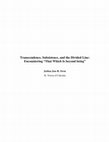
I. An Innate Inclination: That-which-is-beyond-being Recorded history has always shown man as som... more I. An Innate Inclination: That-which-is-beyond-being Recorded history has always shown man as someone who seeks for that which is beyond him. i This deep-seated longing has not always been apparent, but when man makes it manifest, it is through practices which are cultic in nature-what we would now refer to as "religion." This makes explicit, man's innate recognition of the transcendent, often understood as that which or who is benevolent and holy. It cannot be denied, then, that in spite of the many arguments hurled against its significance to man, religion has served the purpose of filling in this particular longing in man to link himself to the transcendent. In his Pensées, Blaise Pascal, in response to "unbelievers" who disdain religion for its supposed claim that it has a "clear view of God" and that He is "unveiled" for man to see Him with clarity, affirmed that religion says otherwise; "men are in darkness and estranged from God...He has hidden Himself from their knowledge." ii As
Journal Articles by Joshua Jose Ocon
Theoria: The Academic Journal of the San Carlos Seminary Philosophy Department, 2024

Pamisulu: An Interdisciplinary Journal on Theology and Philosophy, 2024
Despite the characteristically secular and ‘disenchanted’ spirit of our time, many maintain a kin... more Despite the characteristically secular and ‘disenchanted’ spirit of our time, many maintain a kind of tolerance apropos to religiosity, provided only that it remains to be an individual and private affair. This nevertheless prepared and eventually led to the rise of a movement committed to the denigration of religion’s frontiers, especially on the grounds of its rationality and moral authority – the new atheism. Compared to its older forms, the neo-atheistic crusade is more aggressive in approaching religious beliefs, proclaiming how their ‘irrationality’ is to be shunned on account of an encompassing scientific understanding and explanation of the world and its phenomena. Its influence owes greatly to the intellectual assurance and vitriolic style of its Four Horsemen whose respective fields account for an elaborate attack on the religious enterprise. Given the neo-atheistic contentions – that religious beliefs are ‘irrational’ and are responsible for an irrational picture of reality, thus, making religion ‘dangerous’ – this study provides an epistemological critique of the aforementioned through the compatible frameworks of Alvin Plantinga and Jacques Maritain.
It concludes that with all its merits, the new atheism from the standpoint of the synthesis of Plantinga and Maritain fails to eject religion and religious beliefs from the realm of human knowledge and morality.

PHAVISMINDA Journal, 2022
This paper analyzes how Jacques Maritain anticipated much of the questions that can be raised con... more This paper analyzes how Jacques Maritain anticipated much of the questions that can be raised concerning the Church's active participation today in matters that many have supposed to pertain only to politics: To what extent is the Church's involvement in political life permissible in light of its perceived duty to translate its apostolic and spiritual values into social actions? What boundaries does the Church recognize regarding a proper delineation between the spiritual and temporal spheres towards the linking of which Catholic Action is said to be directed? To what limits can the Church exercise its auctoritas within a personalist democracy that emphasizes the common good as its chief aim for the human community? Insights in response to these will show that far from 'meddling' with or 'disrupting' the political order, the Church's approaches are sensible and just within a democracy that Philippine politics embraces.
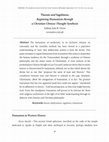
Theoria: The Academic Journal of San Carlos Seminary Philosophy Department, 2023
The humanism of modernity, in its exclusive reliance on rationality and the scientific method, ha... more The humanism of modernity, in its exclusive reliance on rationality and the scientific method, has been viewed as a pejorative understanding of 'man' that deliberately isolates it from the divine. This paper attempts to regain humanism from its position that seems to jeopardize the human tendency for the Transcendent through a synthesis of Chinese philosophy and the major tenets of Christianity. A close analysis of the predominant Chinese thought in Lao Tzu and Confucius shows that its entire history is characterized by humanism, defined, not as that which denies the divine but as one that "proposes the unity of man and Heaven." This consilience between man and Heaven is realized in the sage. Similarly, Christianity, albeit the antagonism of humanism, is in fact "the greatest humanism that has ever appeared [and] that could ever appear," manifested by its adherence to theosis-God becoming man, so that man might become God. From this standpoint, humanism still proves to be relevant for those with religious inclinations in the light of its fuller understanding through its dialectic with Chinese and Christian philosophy.
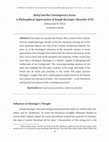
Theoria: The Academic Journal of San Carlos Seminary Philosophy Department, 2022
Even before he assumed the Petrine office as head of the Catholic Church, Joseph Ratzinger alread... more Even before he assumed the Petrine office as head of the Catholic Church, Joseph Ratzinger already carries the reputation of being one of the most important figures, not only of the Catholic intellectual tradition, but more so of the theological enterprise of the twentieth century. A closer appreciation of his thought which delves into the relevant discussions of the time, such as those that tackle pluralism and relativism, further reveals that more than a theologian, Ratzinger is a 'thinker' capable of dialoguing with intellectuals of any background. This noncompromising openness to the ideas that challenge his own gives credence to the range and depth of the beliefs that he holds and proclaims to the world. This paper presents Ratzinger's insights that elicit a philosophical analysis based on the themes that concern the relevance of belief-the Christian faith-to the theoretical and practical movements of the contemporary period.
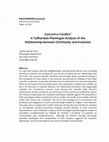
PHAVISMINDA Journal, 2021
It is said that science, since the Enlightenment, had advanced with an ever-increasing intensity ... more It is said that science, since the Enlightenment, had advanced with an ever-increasing intensity to reinvent and develop the way we see ourselves and our relationship with the world. The nascent scientific worldview then brought about a profound change in the conception of man's place in the universe, and among the findings of the major scientific revolutions, it was that of Charles Darwin which proved to be most impactful. What sets him apart from his predecessors who attempted to explain the evolution of life is his discovery of natural selection, the theoretical mechanism that supposedly underlies the evolutionary process. Even beyond the scientific field, Darwin's achievement remains prominent up to this day as it has come to be utilized by twentyfirst-century intellectuals who champion nonchalant diatribes against the enterprise of faith and religious belief, considered to be in conflict and wholly irreconcilable with the truths that science has unearthed. This led to the emergence of a movement that professes close allegiance to science and downright disdain for religion-New Atheism. This paper aims to analyze the 'conflict' between Christianity and evolution as narrated by neo-atheists, having evolutionary biologist Richard Dawkins as their foremost representative. Such evaluation employs Alvin Plantinga's epistemological critique of naturalism, complemented by Teilhard de Chardin's conception of evolution as 'hominization' and 'complexification.' Although De Chardin's thought historically precedes Plantinga's, the compatibility of their analyses suggests the scientific, philosophic, and even theological concord of Christianity and evolution.
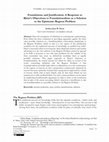
TALISIK: An Undergraduate Journal of Philosophy, 2021
Since the resurgence of infinitism in contemporary epistemology, Peter Klein has been consistent ... more Since the resurgence of infinitism in contemporary epistemology, Peter Klein has been consistent in providing arguments against the three other possible solutions (i.e., foundationalism, coherentism, skepticism) to the Regress Problem, which in turn is a key aspect of the justification condition for the traditional account of knowledge as justified true belief. Klein's successful effort in reviving the often-dismissed solution and further advancing it as the sole solution to the Regress Problem cannot be ignored as he finds it necessary to not only raise problems for the viability of the three contenders but, more so, definitively invalidate them as equally possible solutions. This paper responds to Klein's objection to foundationalism, the crucial reasons for which he offers in several of his works concerning infinitism and the Regress Problem: i) that foundationalism inevitably leads either to arbitrariness or to the continuation of the regress of reasons; ii) that a proposition continuously enhanced by reasons has more epistemic warrant than a proposition supported by a chain of reasons which ends at basic beliefs, and; iii) that basic beliefs are not tantamount to fully justified beliefs. For each, certain problems can be raised by employing foundationalist arguments in order to arrive at the conclusion that in spite of his astute reasoning, Klein's objection is insufficient to rule out foundationalism as a possible solution to the Regress Problem.
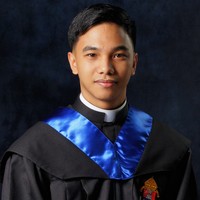
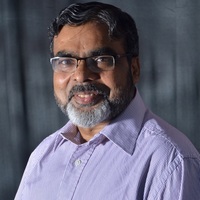







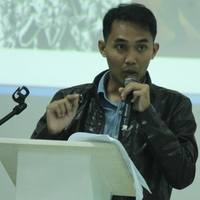

Uploads
Videos by Joshua Jose Ocon
Essays by Joshua Jose Ocon
Journal Articles by Joshua Jose Ocon
It concludes that with all its merits, the new atheism from the standpoint of the synthesis of Plantinga and Maritain fails to eject religion and religious beliefs from the realm of human knowledge and morality.
It concludes that with all its merits, the new atheism from the standpoint of the synthesis of Plantinga and Maritain fails to eject religion and religious beliefs from the realm of human knowledge and morality.